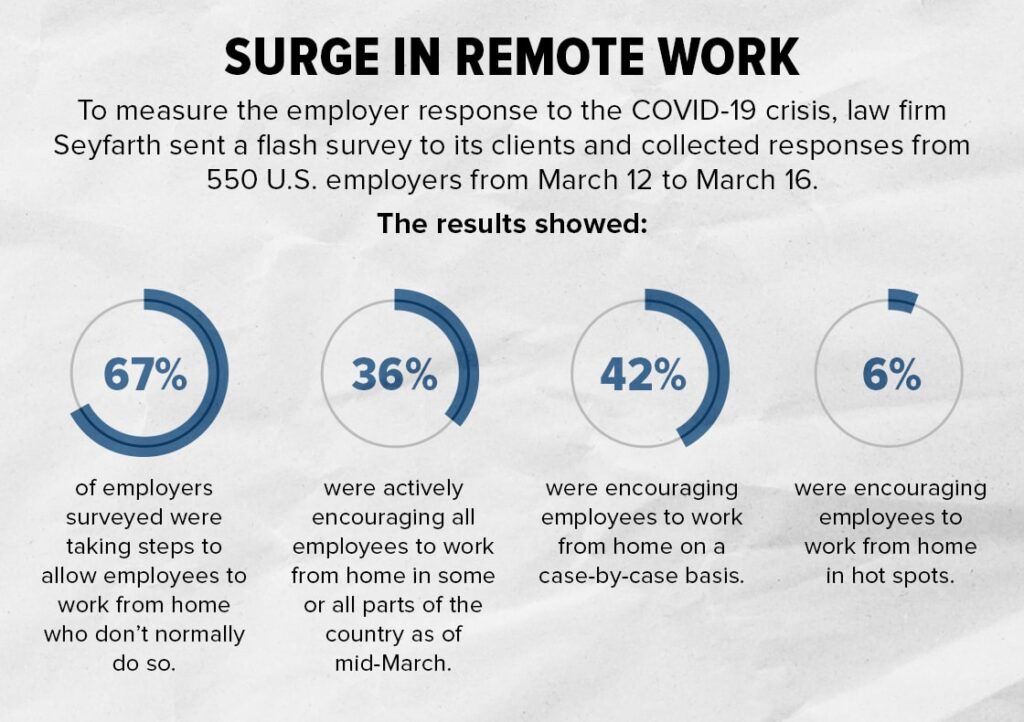Introduction

Remote work sounded like a dream come true, didn’t it? No more long commutes, more time with family, and the comfort of working in your pajamas. But as the months rolled on, the reality began to set in. The lines between work and home blurred, and the isolation started to take its toll. For many, remote work has been a double-edged sword, offering flexibility at the cost of mental well-being.
What is Remote Work?
Remote work means doing your job from a place other than the traditional office. This could be from home, a coffee shop, or anywhere with an internet connection. It became widespread thanks to technology like video calls and collaboration tools, making it possible to stay connected no matter where you are.
The Evolution of Remote Work

Image Source – SHRM
Remote work isn’t new. It began gaining traction in the 1970s with the rise of technology. However, it wasn’t until the early 2000s, with the advent of high-speed internet and cloud services, that working from home became more feasible. The COVID-19 pandemic accelerated this shift dramatically, transforming remote work from a perk to a necessity almost overnight.
The Impact on Mental Health while Working Remotely
Remote work has profoundly affected our mental health in ways we might not have anticipated:
- Isolation and Loneliness: Without the daily hustle and bustle of an office, many of us feel isolated. The casual chats shared lunches, and spontaneous brainstorming sessions are missing, leading to a sense of loneliness.
- Work-Life Balance: The flexibility of working from home can backfire, making it hard to separate work time from personal time. Many find themselves answering emails late at night or working weekends, leading to burnout.
- Lack of Physical Activity: The commute to an office often included some form of physical activity. Now, the walk from the bed to the desk is our new routine, which isn’t enough to keep us active and healthy.
- Communication Challenges: Communicating through screens lacks the warmth and immediacy of face-to-face interactions. Misunderstandings can occur, and the sense of team camaraderie can diminish.
Why Our Mental Health Suffers
Several factors during remote work contribute to mental health issues:
- Lack of Routine: Without a structured day, it’s easy to lose track of time and let work consume our lives, leading to anxiety and stress.
- Overworking: The line between work and home life becomes blurry, often resulting in longer work hours and less downtime.
- Digital Overload: Being constantly connected can be exhausting. The barrage of emails, messages, and virtual meetings can lead to digital fatigue.
The Isolation Trap
Working remotely can feel like being on an island. The absence of in-person interactions can lead to feelings of isolation and loneliness. Humans are social creatures; we thrive on connection. Without it, our mental health can suffer, leading to decreased motivation and increased stress.
Creating a Healthy Remote Work Environment to Protect Your Mental Health

To combat these challenges, it’s crucial to create a healthy work environment:
- Set a Routine: Establishing a daily schedule can help maintain a sense of normalcy. Start your day with a morning routine and set clear work hours.
- Create a Workspace: Designate a specific area for work to keep your professional and personal life separate.
- Stay Connected: Regular check-ins with colleagues and virtual social activities can help maintain a sense of community & also help in protecting mental health.
- Prioritize Mental Health: Take mental health days when needed and use available wellness resources.
You can also follow these quick tips to stay healthy mentally and physically while working remotely.
The Power of Quick Breaks to protect your mental health
Taking short, regular breaks can do wonders for your mental health. Step away from your screen, stretch, take a walk, or simply breathe. These breaks can help reduce stress, improve focus, and keep burnout at bay.
8 Strategies to cope with isolation while working remotely
Conclusion
Remote work has reshaped our lives in many ways. While it offers flexibility, it also brings challenges that can affect our mental health. By understanding these challenges and taking proactive steps, we can create a healthier, more balanced remote work experience. Remember, it’s okay to take a break, reach out for support, and prioritize your well-being. Together, we can navigate the remote work landscape and emerge stronger and more resilient.